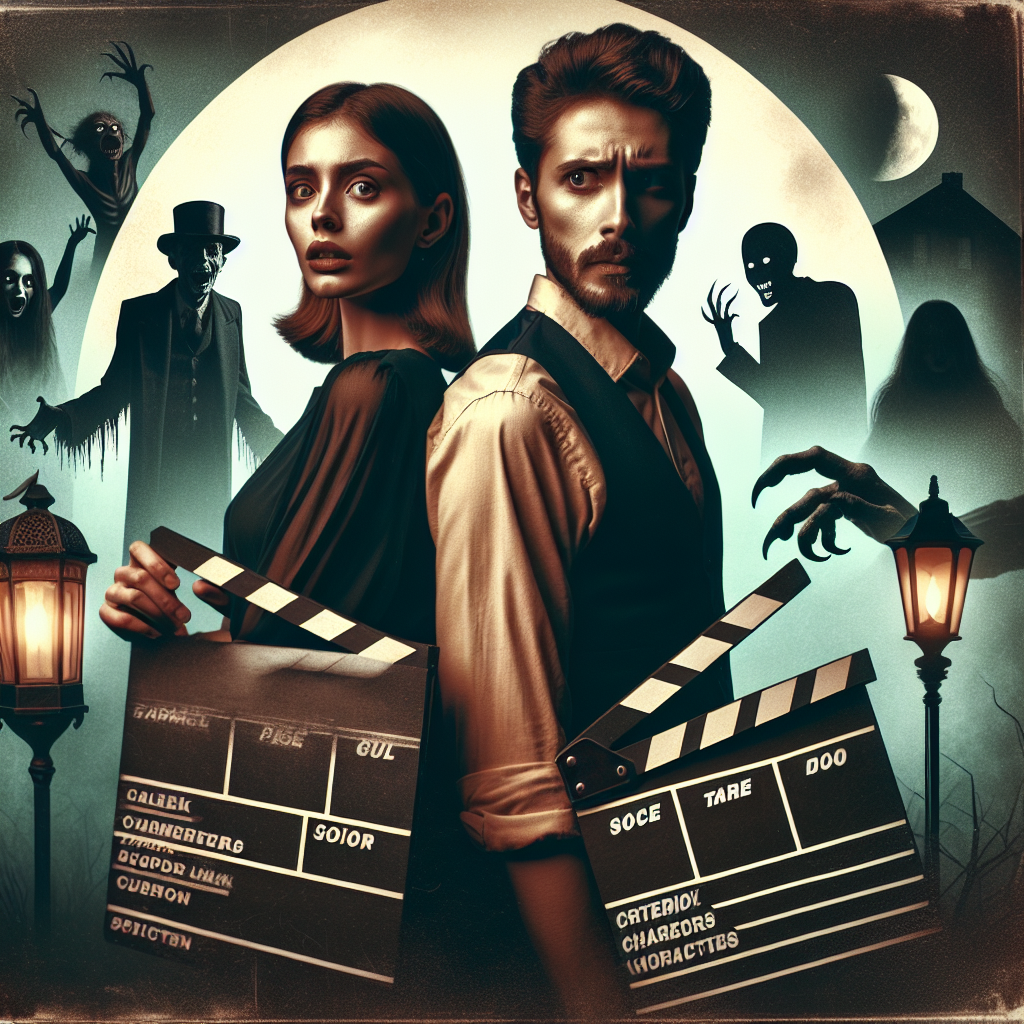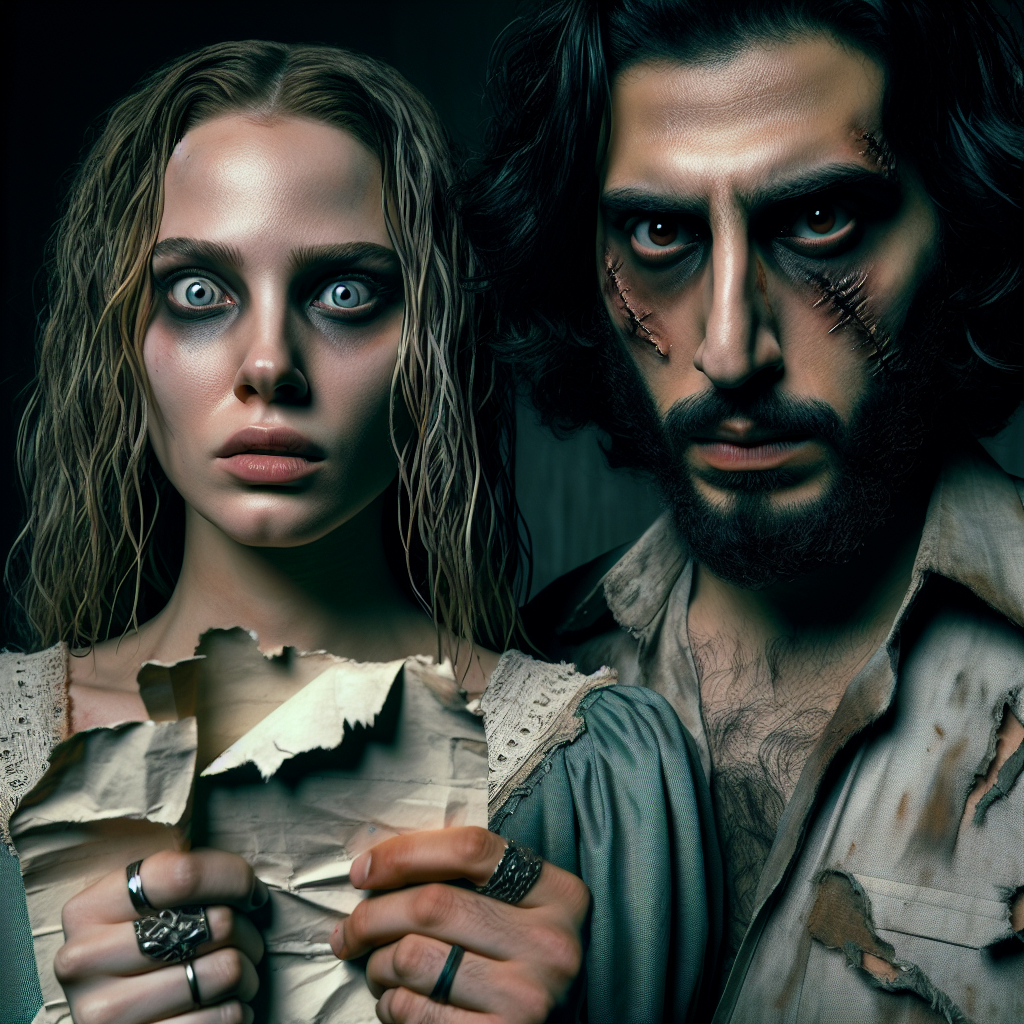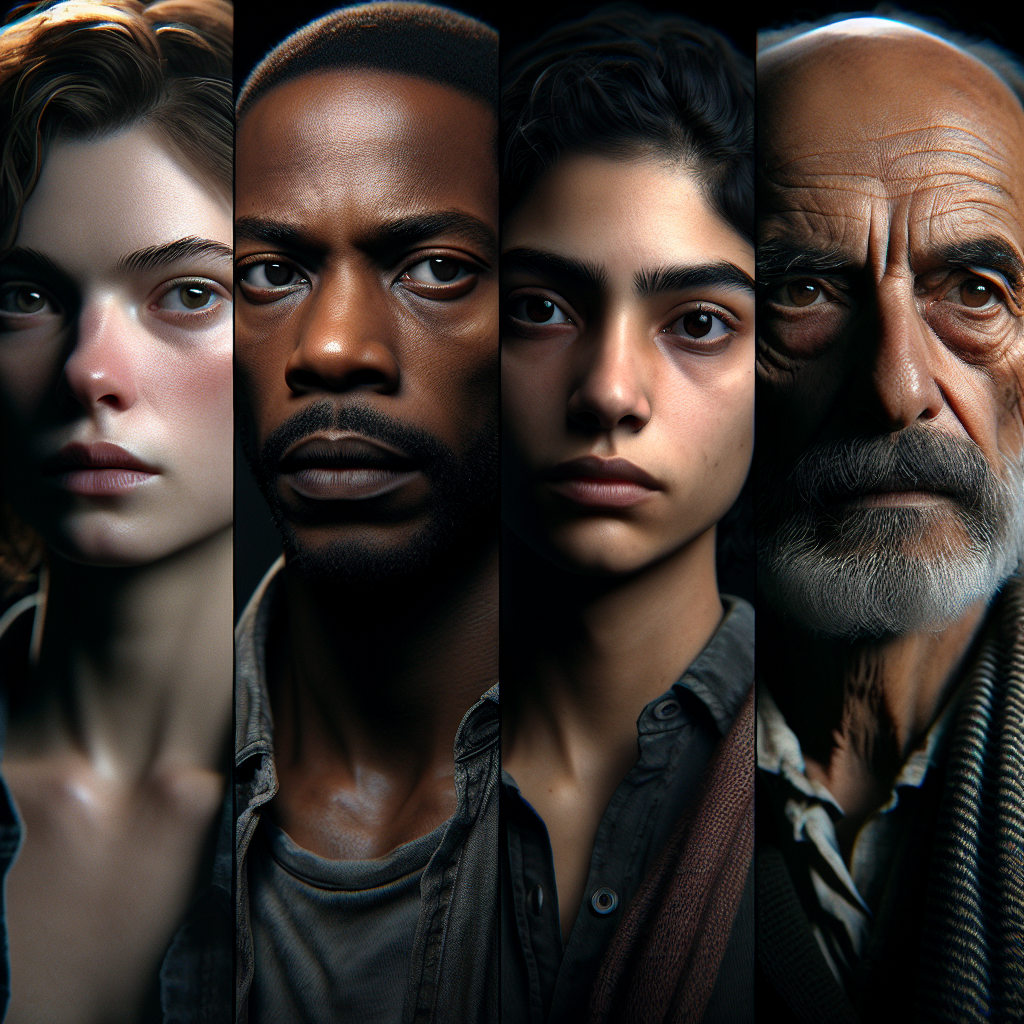In the thrilling world of horror films, there are certain actors who push the boundaries of controversy with their daring and provocative roles. From embodying twisted serial killers to delving into the darkest corners of the human psyche, these performers fearlessly take on characters that spark debate and shock audiences. Their mesmerizing performances force viewers to confront uncomfortable truths and challenge societal norms, leaving a lasting impact long after the credits roll. Join us as we delve into the realm of horror actors who fearlessly embrace controversy and redefine the boundaries of cinematic storytelling.
The Intriguing World of Horror Actors

The horror genre in the film industry has long been a captivating realm where actors delve into the depths of human fear and darkness. From classic monster movies to psychological thrillers, horror films have a unique ability to evoke intense emotions and provoke thought-provoking conversations.
Introduction to Horror Actors Who Embrace Challenging Roles
-
Diving into the Unknown: Horror actors are known for their willingness to push boundaries and explore controversial themes through their performances. They often take on roles that challenge societal norms and provoke discomfort among audiences.
-
Embracing Complexity: These actors are drawn to characters that are morally ambiguous, psychologically troubled, or downright sinister. They see these roles as an opportunity to showcase their range and talent by embodying complex and often unsettling personas.
-
Courage in Controversy: By taking on controversial roles, horror actors demonstrate a fearlessness in tackling taboo subjects and engaging with provocative material. They understand the power of cinema to spark discussions and challenge conventional thinking, and they are unafraid to confront uncomfortable truths through their work.
Factors Driving Horror Actors to Controversial Roles
Passion for the Craft
Factors Driving Horror Actors to Controversial Roles
Horror actors often have a deep-seated passion for their craft, driving them to seek out controversial roles that push the boundaries of storytelling and performance. This passion stems from a desire to challenge themselves, showcase their versatility, and leave a lasting impact on audiences. By taking on controversial roles, these actors demonstrate their commitment to their art and willingness to explore complex and challenging characters.
-
Challenging Roles to Showcase Versatility: Many horror actors are drawn to controversial roles because they offer the opportunity to display a wide range of emotions and skills. These roles often require actors to delve into the darker aspects of human nature, testing their ability to evoke fear, empathy, and suspense in unique ways.
-
Renowned Horror Actors: Throughout cinematic history, there have been several renowned horror actors who have become synonymous with taking on controversial roles. Actors like Anthony Hopkins, known for his chilling portrayal of Hannibal Lecter in “The Silence of the Lambs,” and Linda Blair, who shocked audiences with her performance in “The Exorcist,” have solidified their reputations by fearlessly tackling provocative and boundary-pushing characters.
Desire to Challenge Conventions
- Exploration of how horror actors aim to defy stereotypes and expectations
Horror actors often seek out controversial roles as a means to challenge the conventions of their genre and push the boundaries of traditional storytelling. By taking on roles that defy stereotypes and expectations, these actors can showcase their range and versatility as performers. Embracing controversial characters allows them to delve into complex and morally ambiguous personas that may not align with the typical hero or heroine roles found in mainstream cinema. This desire to challenge conventions enables horror actors to demonstrate their acting prowess and captivate audiences with compelling and thought-provoking portrayals.
- Impact of controversial roles on an actor’s career and public perception
Engaging with controversial roles can have a significant impact on an actor’s career trajectory and public perception. While some may view these roles as bold career moves that showcase an actor’s fearlessness and dedication to their craft, others may perceive them as risky choices that could potentially alienate fans or tarnish their reputation. However, for many horror actors, the opportunity to tackle controversial roles presents a unique chance to stand out in a crowded industry and leave a lasting impression on audiences. Despite the potential challenges and criticisms that may arise from taking on such roles, the rewards of pushing boundaries and challenging conventions can ultimately lead to greater recognition and respect within the film community.
The Thin Line Between Art and Controversy
Artistic Freedom vs. Moral Responsibility
In the realm of horror films, the debate surrounding the portrayal of controversial roles often centers on the delicate balance between artistic freedom and moral responsibility. This ongoing discussion raises critical questions about the ethical considerations that actors face when taking on extreme characters in the genre. Some key points to consider include:
-
Exploration of Dark Themes: Horror actors often gravitate towards roles that push boundaries and explore the darkest aspects of human nature. While this can be seen as a form of artistic expression, it also raises concerns about the potential impact of these portrayals on audiences.
-
Challenging Societal Norms: By embodying characters that challenge societal norms and provoke discomfort, actors in horror films play a significant role in pushing the boundaries of acceptability in cinema. This can lead to discussions about the role of art in reflecting and sometimes challenging prevailing moral standards.
-
Impact on Perception: The portrayal of controversial roles by horror actors can have a lasting impact on how they are perceived both on and off-screen. Balancing the pursuit of artistic authenticity with the potential consequences of being associated with morally questionable characters is a constant struggle for performers in the genre.
-
Navigating Public Reception: Horror actors who take on controversial roles often find themselves at the center of public debates about the boundaries of artistic freedom and the responsibilities that come with being a public figure. Navigating these discussions requires a nuanced understanding of the complexities involved in portraying extreme characters.
Psychological Impact on Actors
-
Emotional Immersion: Horror actors often find themselves deeply immersed in the dark and unsettling world of their characters. This level of emotional engagement can take a toll on their mental well-being as they navigate the disturbing thoughts and actions of their roles.
-
Nightmares and Intrusive Thoughts: Portraying controversial characters can lead to actors experiencing nightmares and intrusive thoughts outside of filming hours. The lines between fiction and reality can become blurred, causing distress and unease.
-
Ethical Dilemmas: Delving into the minds of villains and morally ambiguous characters can raise ethical dilemmas for actors. They may grapple with the implications of humanizing or glorifying characters that engage in heinous acts.
-
Impact on Personal Relationships: The psychological impact of controversial roles can extend beyond the set and affect actors’ personal relationships. Loved ones may struggle to separate the actor from the character, leading to strained interactions and emotional distress.
-
Coping Mechanisms: To navigate the psychological challenges of portraying controversial roles, actors often rely on various coping mechanisms. These may include therapy, mindfulness techniques, and engaging in activities that promote mental well-being.

Navigating Criticism and Backlash
Dealing with Public Outcry
When horror actors take on controversial roles, they often find themselves at the center of public outcry and criticism. The way they handle this backlash can significantly impact their careers and public image. Here are some key points to consider:
-
Analyzing the Root of Criticism: Actors must first understand the reasons behind the public outcry. This involves dissecting the themes, messages, and representations in the controversial role to address specific concerns raised by audiences and critics.
-
Engaging with Critics: Instead of ignoring or dismissing criticism, horror actors often choose to engage with their detractors. By participating in interviews, social media discussions, and public forums, they can explain their motivations for taking on the role and provide context for their artistic choices.
-
Expressing Artistic Integrity: One of the main strategies used by actors is to defend their decisions as a form of artistic expression. They may highlight the complexities of the character they portray, the social commentary embedded in the storyline, or the challenges of pushing boundaries within the horror genre.
-
Seeking Support from Peers: In times of public outcry, horror actors may seek support from their fellow industry professionals. This can involve receiving advice from experienced colleagues, garnering endorsements from directors or producers, or collaborating with like-minded artists who share their vision for the controversial role.
-
Navigating the Fallout: Despite their best efforts, some actors may face long-lasting repercussions from taking on controversial roles. This could range from losing endorsements and job opportunities to enduring personal attacks and online harassment. Navigating this fallout requires resilience, self-reflection, and a willingness to learn from the experience.
Impact on Personal and Professional Life
Navigating Criticism and Backlash
Controversial roles in horror films can have a profound impact on the personal and professional lives of actors. Here are some key points to consider:
-
Mental and Emotional Toll: Taking on controversial roles can take a significant mental and emotional toll on actors. Delving into dark and disturbing characters can lead to psychological strain and emotional distress, affecting their overall well-being.
-
Public Perception: Actors who portray controversial characters may face backlash and criticism from the public. Some audiences may struggle to separate the actor from the character they portray, leading to negative perceptions and judgment.
-
Career Trajectory: Engaging in contentious projects can also impact an actor’s career trajectory. While some may see it as a bold move that showcases their versatility, others in the industry may view it as a risky choice that could potentially limit future opportunities.
-
Typecasting: There is a risk of being typecast for taking on controversial roles in horror films. Actors may find themselves pigeonholed into similar roles, making it challenging to break away from the stereotype and explore a diverse range of characters.
-
Industry Relationships: Working on contentious projects can strain relationships within the industry. Some filmmakers or producers may be hesitant to collaborate with actors known for controversial roles, fearing potential controversies or public backlash.

In conclusion, while taking on controversial roles in horror films can be a bold creative choice, it is essential for actors to carefully consider the potential impact on their personal and professional lives before committing to such projects.
Evolution of Horror Actors in the Industry
Changing Perceptions Over Time
Evolution of Horror Actors in the Industry
-
Audience Acceptance: Initially, horror actors taking on controversial roles faced significant backlash from audiences due to the graphic nature of the content. Over time, as societal norms evolved and viewers became more desensitized to violence and gore, there was a shift in audience acceptance towards these provocative roles.
-
Critical Reception: In the past, controversial roles in horror films were often dismissed by critics as mere shock value without much artistic merit. However, as the genre gained more recognition and respect in the industry, there has been a gradual acknowledgment of the skill and dedication required for horror actors to portray such challenging characters convincingly.
-
Impact of Cult Classics: Cult classic horror films from the past have played a crucial role in shaping the perception of controversial roles in the genre. These films, although initially met with controversy, have garnered a dedicated fan base over time, leading to a reevaluation of the performances and themes explored by horror actors in these movies.
Breaking Stereotypes and Redefining Boundaries
Horror actors have long been at the forefront of challenging stereotypes and pushing boundaries within the film industry. Their willingness to take on controversial roles has not only redefined the genre but also paved the way for more complex and nuanced portrayals on screen. Here are some key points to consider:
-
Diversifying Character Portrayals: Horror actors have played a significant role in diversifying the types of characters seen in horror films. By taking on controversial roles that break away from traditional stereotypes, they have helped create more dynamic and multifaceted characters that defy expectations.
-
Exploring Taboo Subjects: These actors have fearlessly tackled taboo subjects that other genres might shy away from. By delving into themes such as mental illness, sexuality, and societal issues, they have sparked important conversations and challenged audiences to confront uncomfortable truths.
-
Championing Representation: Horror actors have also been at the forefront of championing representation on screen. By portraying characters from marginalized communities or underrepresented backgrounds, they have helped bring greater diversity and authenticity to horror films, making the genre more inclusive and reflective of society as a whole.
-
Pushing Creative Boundaries: Through their willingness to take on controversial roles, horror actors have pushed creative boundaries and elevated the genre to new heights. Their fearless approach to storytelling has inspired filmmakers to think outside the box and experiment with unconventional narratives, ultimately shaping the future of horror cinema.
FAQs: Horror Actors Who Take on Controversial Roles
Why do horror actors often take on controversial roles?
Horror actors often branch out and take on controversial roles for a variety of reasons. Some may be drawn to the challenge of playing a complex and morally ambiguous character, while others may see it as an opportunity to push boundaries and explore dark themes in their work. Additionally, controversial roles can generate buzz and critical acclaim, helping to elevate an actor’s career and showcase their range and versatility.
How do horror actors navigate the backlash or controversy that can come with these roles?
When horror actors take on controversial roles, they often have to navigate potential backlash from audiences, critics, and even fellow actors. Some choose to address the controversy head-on, engaging in discussions about the themes and motivations behind their character. Others may choose to focus on the artistic merits of the role and how it contributes to the overall story. Ultimately, each actor must decide how they want to respond to the controversy and stand by their choices.
Are there any risks for horror actors who take on controversial roles?
Taking on controversial roles can come with risks for horror actors, from potential damage to their reputation to backlash from fans and the industry. However, many actors see these risks as worth taking in order to challenge themselves creatively and explore complex and challenging material. By carefully considering the role and its impact, as well as staying true to their artistic vision, horror actors can navigate these risks and come out on the other side with a powerful and memorable performance.
